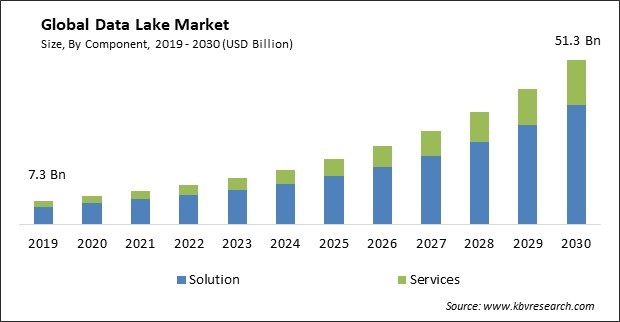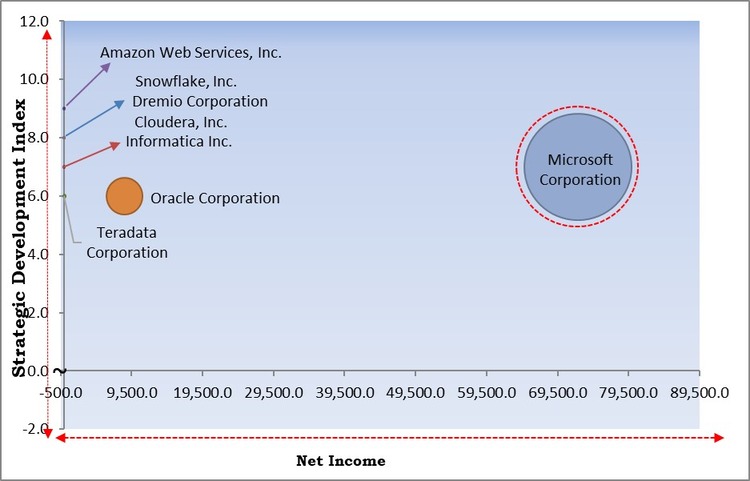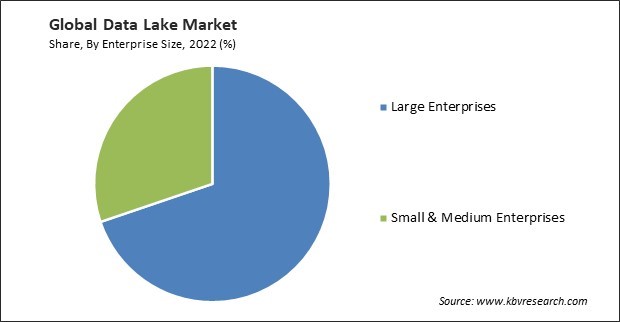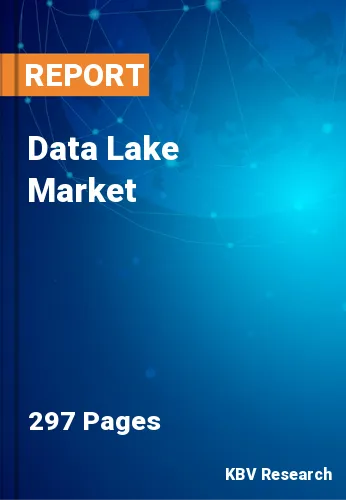The Global Data Lake Market size is expected to reach $51.3 billion by 2030, rising at a market growth of 19.8% CAGR during the forecast period.
Cloud-based data lakes integrate seamlessly with various data sources and cloud services, facilitating data ingestion, transformation, and integration. Consequently, the Cloud segment would capture around 45% share of the market by 2030. Cloud data lakes offer robust security features, encryption, access control, and compliance with industry-specific regulations, easing organizations' data governance and compliance efforts. Cloud-based data lakes are well-suited for running advanced analytics workloads, including machine learning and AI. Organizations can leverage cloud-based analytics services and tools to gain deeper insights from their data.

The major strategies followed by the market participants are Product Launches as the key developmental strategy to keep pace with the changing demands of end users. For instance, In July, 2023, Oracle Corporation unveiled MySQL HeatWave Lakehouse, allowing customers to query object storage data as quickly as database data. Additionally, In September, 2023, Dremio Corporation announced the next-generation Reflections for sub-second analytics, spanning the entire data ecosystem, regardless of data location. The new product redefines data access, enabling swift insights at 1/3 the cost of a cloud data warehouse.
Based on the Analysis presented in the KBV Cardinal matrix; Microsoft Corporation is the forerunners in the Market. In May, 2023, Microsoft Corporation unveiled Microsoft Fabric, a comprehensive unified analytics platform that consolidates essential data and analytics tools. The platform combines Azure Data Factory, to unleash the power of their data and prepare for the AI era. Companies such as Oracle Corporation, Amazon Web Services, Inc., Snowflake, Inc. are some of the key innovators in the Market.

Organizations are generating more data than ever, owing to digital transformation, IoT devices, social media, and other data sources. This explosion of data has created a demand for storage solutions that can endure massive amounts of structured and unstructured data. Data lakes can store various data types, including text, images, videos, log files, and sensor data. The growing need to extract insights from large volumes of data has driven organizations to invest in data lakes as a foundational data management and analytics solution. These platforms provide the agility, scalability, and flexibility needed to unlock the full potential of data and stay competitive in today's data-driven world. Hence, these factors will aid in the expansion of the market.
The rapid growth of advanced analytics technologies has been a significant driver of the development of the market. Advanced analytics encompasses a range of sophisticated techniques and tools, including machine learning, artificial intelligence, predictive analytics, and data mining, which require extensive and diverse datasets for meaningful insights. Advanced analytics requires access to large volumes of historical and real-time data. Data lakes provide a cost-effective and scalable solution for storing massive datasets, making them readily available for analysis. Data lakes facilitate data preparation by providing a central location for raw data, enabling data engineers and scientists to access and shape data as needed. As organizations increasingly acknowledge the value of data-driven insights, data lakes play a vital role in enabling advanced analytics capabilities and driving innovation across various industries. Thus, the rapid growth of technologies will augment the expansion of the market.
Regulatory bodies, such as the Health Insurance Portability and Accountability Act (HIPAA) in the United States and the General Data Protection Regulation (GDPR) in Europe, impose stringent data security and privacy requirements. Organizations using data lakes must implement strong safety measures to protect sensitive data and secure compliance with these regulations. Many regulations mandate specific data retention and deletion policies. Organizations must configure data lakes to adhere to these requirements, which can be complex when dealing with vast datasets. Beyond regulatory compliance, organizations must also consider legal and ethical aspects when managing data within data lakes. This includes addressing potential legal liabilities and ethical concerns associated with data use. The regulatory compliance challenges can pose obstacles for the market.
On the basis of component, the market is segmented into solution and services. The services segment acquired a substantial revenue share in the market in 2022. Service providers offer ongoing support and maintenance to ensure the continued dependability and availability of the data lake environment. This includes monitoring, troubleshooting, and applying updates and patches. These services assist in ingesting data from various sources into the data lake. Service providers can help with data extraction, transformation, and loading (ETL) processes, ensuring that data is appropriately formatted and cleansed before storage.
By enterprise size, the market is bifurcated into large enterprises and small & medium enterprises. The large enterprises segment acquired the highest revenue share in the market in 2022. Data lakes are highly scalable, allowing organizations to store and manage petabytes of data or more as their data volume grows. This scalability accommodates the increasing data needs of large enterprises. Data lakes often use cost-effective storage solutions, such as cloud storage or Hadoop Distributed File System (HDFS), which can significantly reduce storage costs compared to traditional data warehousing.

Based on deployment type, the market is fragmented into on-premise and cloud. The cloud segment garnered a significant revenue share in the market in 2022. Significant data lake parasol vendors provide cloud-based solutions that automate equipment maintenance processes and increase profits. In addition, the adoption of cloud data lakes is anticipated to increase due to their adaptability, scalability, flexibility, and cost-effectiveness. Companies favor cloud-based solutions, which facilitate cross-regional, cross-regional, and cross-national information storage and recovery strategies.
By vertical, the market is classified into IT, BFSI, retail & Ecommerce, healthcare, media & entertainment, manufacturing, and others. The retail and Ecommerce segment recorded a remarkable revenue share in the market in 2022. Data lakes could play a crucial role in retail marketing, as they would facilitate rapid classification of potential customers. Data lakes would provide an in-depth understanding of buyers, their purchasing motivations, and their requirements by analyzing information gathered from various sources, such as call logs, surveys, and social media platforms. Retailers can analyze customer purchase patterns and discover associations between products frequently purchased together.
| Report Attribute | Details |
|---|---|
| Market size value in 2022 | USD 12.3 Billion |
| Market size forecast in 2030 | USD 51.3 Billion |
| Base Year | 2022 |
| Historical Period | 2019 to 2021 |
| Forecast Period | 2023 to 2030 |
| Revenue Growth Rate | CAGR of 19.8% from 2023 to 2030 |
| Number of Pages | 289 |
| Number of Table | 450 |
| Report coverage | Market Trends, Revenue Estimation and Forecast, Segmentation Analysis, Regional and Country Breakdown, Competitive Landscape, Companies Strategic Developments, Company Profiling |
| Segments covered | Component, Enterprise Size, Deployment Type, Vertical, Region |
| Country scope | US, Canada, Mexico, Germany, UK, France, Russia, Spain, Italy, China, Japan, India, South Korea, Singapore, Malaysia, Brazil, Argentina, UAE, Saudi Arabia, South Africa, Nigeria |
| Growth Drivers |
|
| Restraints |
|
Region-wise, the market is analysed across North America, Europe, Asia Pacific, and LAMEA. In 2022, the North America region witnessed the largest revenue share in the market. The rapid pace of growth in North America can be attributed to the increasing use of big data technology, the rising volume of data across industry verticals, and the rising investment in data lake solutions by businesses. In the United States, associations have begun utilizing data lake solutions to generate actionable insights from structured and unstructured data to remain competitive. Growing the generation of data, such as clickstream data, server logs, customer data, customer relationship management (CRM), and Enterprise Resource Planning (ERP), causes vendors to launch multiple data lake services and products to cater to various demands of the organizations and their customers.
Free Valuable Insights: Global Data Lake Market size to reach USD 51.3 Billion by 2030
The market research report covers the analysis of key stake holders of the market. Key companies profiled in the report include Amazon Web Services, Inc., Cloudera, Inc., Dremio Corporation, Informatica Inc., Microsoft Corporation, Oracle Corporation, SAS Institute Inc., Snowflake Inc., Teradata Corporation and Zaloni, Inc.
By Component
By Enterprise Size
By Deployment Type
By Vertical
By Geography
This Market size is expected to reach $51.3 billion by 2030.
Increasing need to extract insights from vast volumes of data are driving the Market in coming years, Regulatory compliance-related data usage complexities restraints the growth of the Market.
Amazon Web Services, Inc., Cloudera, Inc., Dremio Corporation, Informatica Inc., Microsoft Corporation, Oracle Corporation, SAS Institute Inc., Snowflake Inc., Teradata Corporation and Zaloni, Inc.
The On-premise segment is generating the maximum revenue in the Market, By Deployment Type in 2022; thereby, achieving a market value of $27.6 billion by 2030.
The Solution segment is leading the Market, By Component in 2022; thereby, achieving a market value of $37.4 billion by 2030.
The North America region dominated the Market, By Region in 2022, and would continue to be a dominant market till 2030; thereby, achieving a market value of $17.5 billion by 2030.
Our team of dedicated experts can provide you with attractive expansion opportunities for your business.

